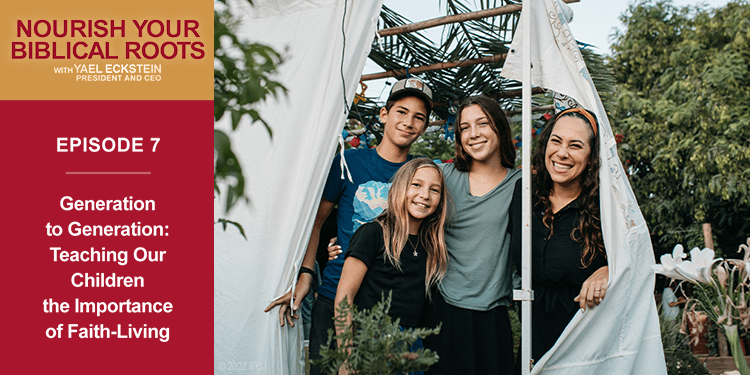Generation to Generation: Teaching Our Children the Importance of Faith-Living

What’s the greatest distance between two points? As host Yael Eckstein shares on today’s program, it’s the distance between our head and our heart. On an intellectual level, we know what we believe, but acting on that belief is another thing. Bridging this distance is part of our life-long service to God, what Yael calls “faith-living.” Every year during the observance of Sukkot, the Festival of Tabernacles (Booths), the Jewish people practice “faith-living” by leaving the comfort of their homes and living in a rickety makeshift shelter known as a sukkah. As she and her family eat and sleep in their sukkah for seven days, Yael explains they are reminded that we live by faith in God, trusting Him to provide all our needs — just as the Israelites did thousands of years ago while wandering through the desert for 40 years. Listen today for this invaluable lesson for our children.
Episode Notes:
Every year the Jewish people practice this concept of faith-living on the holiday of Sukkot, the Feast of Tabernacles. For seven days, they leave the comfort of their homes and live outside in a rickety hut called a sukkah as a reminder of God’s provision and protection. Their sukkot (plural for sukkah) are reminiscent of the huts that the Israelites lived in while they wandered the harsh desert following their Exodus from Egypt.
The Bible tells us that God provided a pillar of cloud during the day and a pillar of fire at night to guide His people (Exodus 13:21). In addition, God provided manna from the sky for them to eat, a traveling well of water for them to drink, and shelters to live in while they camped. On Sukkot, the Jewish people remember all of God’s provisions for His children, just as the psalmist said, “For in the time of trouble he shall hide me in his pavilion: in the secret of his tabernacle shall he hide me; he shall set me up upon a rock” (Psalm 27:5 KJV).
Sukkot is celebrated in the fall, just a few days after the High Holy Days of Rosh Hashanah and Yom Kippur. The Jewish custom is to begin building a sukkah immediately after Yom Kippur ends. The walls are usually constructed out of simple pieces of wood or from canvas, but the roof, called schach, must be created out of natural materials like bamboo or tree branches and must be sparse enough so that the stars can be seen from inside the structure.
“During this holiday, we eat, sleep, and spend as much time as we can inside the holy sukkah,” said Yael. “We try to make it resemble a home as much as possible, and we are encouraged to decorate it beautifully.”
Interestingly, although Sukkot is probably one of the lesser known of the Jewish holidays, the Bible describes it as a holiday for all nations in the messianic era. The Book of Zechariah tells us that “the survivors from all the nations…will go up year after year to worship the King, the Lord Almighty, and to celebrate the Festival of Tabernacles” (14:16). This holiday has universal and eternal significance for people of all faith, as the prophet Zechariah proclaimed, “The Lord will be king over the whole earth. On that day there will be one Lord, and his name the only name” (14:9).
“In truth, we always live by the grace of God,” said Yael. “The difference is that all year long we create the illusion that we are in control of our destiny. We live in our big, strong homes with door locks and alarms. Many of us enjoy climate-controlled houses that provide us with comfort in the heat and the cold, and immunity from the weather. However, once we step into the sukkah, we realize that we are no longer in control.
“Our sukkah is intended to be a metaphor for life, reminding us that in spite of all the scientific and technological success that God has allowed us, we never have been — nor ever will be — in charge of our destiny. Only God holds the reins of the world — we live or die by His will alone,” Yael said.
Learn more about Sukkot, the Festival of Tabernacles, when you visit our Learn Center.
